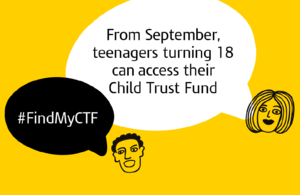Scottish teenagers each to get access to pot of money over the next nine years
Hundreds of thousands of teenagers in Scotland are set to benefit from maturity of Child Trust Funds.

Hundreds of thousands of teenagers in Scotland are set to benefit for the first time from money in Child Trust Funds (CTFs) that has been waiting for them since they were young children.
Since 2002, around 6.3 million CTF accounts have been set up across the UK, roughly 4.5 million by parents or guardians and a further 1.8 million set up by HMRC where parents or guardians did not open an account. In Scotland there are approximately 447,000 accounts.
This means some children do not know there are accounts in their name, so are unaware their money is waiting for them.
From 1 September 2020, the oldest children will turn 18 and be able to access their money.
Around 55,000 accounts will mature each month and HMRC has created a simple online tool to help young people find out where their account is held.
If a parent or guardian is unsure of where their child’s CTF account is held they can also use this tool.
For those who do not have the identifying information required to access the tool, HMRC will provide alternative, non-digital routes to finding a CTF provider upon request.
HMRC and The Share Foundation are also working together to help children in need of further support.
HMRC will send details of the CTF provider by post within three weeks of receiving their request.
Economic Secretary to the Treasury, John Glen, said:
We want to make sure all young people can access the money which has been set aside for them, to invest in their future and continue a savings habit, as they turn 18.
If you’re unsure if you have an account or where it may be, it’s easy to track down your provider online.
UK Government Minister for Scotland, Minister Duguid, said:
This will be a welcome boost for many Scottish young people, particularly welcome in what has been a difficult year for many. I encourage all young people aged between 16 – 18 years in Scotland to check if they have a dormant Child Trust Fund. This money, provided by UK Government, is rightly yours. It only takes a few minutes of your time to check your eligibility online.
The accounts were set up to encourage positive financial habits and a saving culture among the young account holders. HMRC is working with the Money and Pension Service (MaPS) and the CTF providers to continue to provide financial education to the beneficiaries.
CTFs were originally set up for children born between 1st September 2002 and 2nd January 2011, with a live Child Benefit claim.
Parents and guardians received a voucher to deposit in a Child Trust Fund (CTF) account on behalf of the child. At 16 years, the child can choose to operate their account or have their parent continue to operate it, but they cannot withdraw the funds.
At 18 years of age, the CTF account matures and the child is able to withdraw money from the fund or move it to a different savings account. Over 700,000 accounts will mature each year.
The accounts are not held by HMRC, but by a number of CTF providers who are financial services firms. Anyone can pay into the account, with an annual limit of £9,000 and there’s no tax to pay on the CTF savings interest or profit.
Notes for Editors
Parents and guardians who adopted a child or were given parental responsibility through a court will be contacted with further information.
Where there is no person with parental responsibility available to manage the CTF, the account is managed on the child’s behalf by a charity – The Share Foundation.
A postal address will be provided for people who are unable to access the digital tool to request details of their CTF provider from HMRC.
We have recognised that the online form that we provided for customers to trace their CTF requires a level of identity verification that many 16 to 18 year olds will not have so have made changes to allow them to access the form with just their National Insurance number.
As we cannot verify the customer’s identity to the same extent with the new system, we cannot give out confidential information, so the customer will need to give their national insurance number.